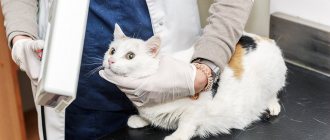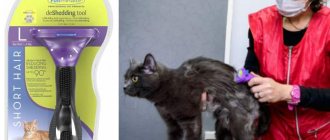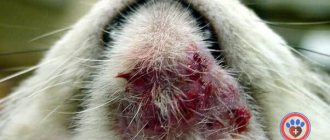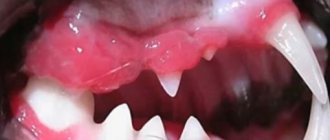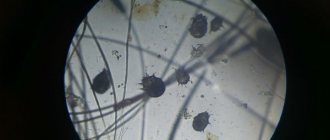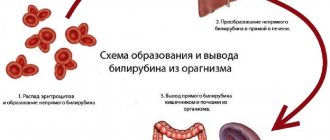Most common symptoms
If you find the symptoms presented below, then you need to take your cat to the clinic, and if the diagnosis is confirmed, then start giving anthelmintic drugs :
- decreased appetite;
- the cat's fur is dull and disheveled;
- meows often and suddenly;
- Loses weight strongly and quickly;
- a rash appeared on the ears;
- the eyes do not stop festering;
- vomiting and diarrhea;
- Red spots appear under the fur.
© shutterstock
Symptoms of cat infestation with worms
Even the most attentive owner is not always able to suspect that a furry pet has become infected with worms, since the severity of symptoms directly depends on the number of helminths living in the cat’s body. If the disease has not become widespread, there may not be any signs of helminthic infestation.
The following signs indicate that a cat is infected with helminths:
- persistent diarrhea or constipation;
- animal weight loss;
- labored breathing;
- dullness and pathological hair loss;
- itching in the anal area;
- vomiting mixed with blood, sometimes with worms;
- Segments or whole worms are visible in the excrement and near the anus;
- feces with blood or mucus;
- lack of appetite or, conversely, bouts of severe gluttony;
- increase in abdominal volume;
- cough;
- severe fatigue, constant sleep;
- developmental delay in kittens;
- miscarriages in pregnant females;
- pallor of the mucous membranes;
- convulsions and paralysis of limbs.
The most pronounced signs of helminthic infestation appear in small kittens due to the weakness of the immune system. The smaller the animal, the higher its chances of death.
Types of anthelmintics
In terms of their scope of action, all drugs that can be used to worm a cat are divided into the following two types:
- single-component, which destroy only a certain type of worms;
- broad-spectrum medications that are used to anthelmintic mixed helminthiasis.
Drops
Depending on the method of application, anti-worm medications come in the form of:
- injections;
- tablets;
- drops;
- sugar cubes;
- pastes or suspensions.
How to properly treat cats for parasitic worms
Contact your veterinarian, he will help you determine the form of worms with which the animal is infected. In addition, the dose of medication for each animal is selected individually , depending on the weight and age of the animal. You should also keep in mind that your cat is pregnant. If it is not possible to contact a specialist, purchase a broad-spectrum medicine. It will remove all types of helminths from the animal’s body.
To identify worms in a cat, blood and feces are given for analysis.
Attention! It is important to know! Many anthelmintic drugs are highly toxic and should not be given to weakened animals. If this rule is not followed, it can lead to serious illness or even death of the animal.
Monitor the animal during the day, it should go to the toilet. If a cat has problems with stool, he is given Duphalac (a laxative syrup, sold in ordinary pharmacies). It is mixed into the animal’s food at the rate of five ml. per one kg. animal weight. Vaseline oil, in an amount of 5 to 10 ml, will also help the cat to empty its intestines. The laxative is poured into the animal’s mouth using a medical syringe.
Duphalac is perfect as a laxative, especially since it can be bought in every pharmacy
Types of drugs for worms
Prazitel suspension is a drug that is used against all types of helminths
- Suspensions or pastes . They are inserted into the animal's cheek using a special syringe. It is sold complete with the medicine.
- Droplet liquid. It is applied to the animal’s withers (a place where the animal cannot lick off the toxic substance). It is easy to use and quickly absorbed.
- Tablets are a common, effective medicine. But the animals do not understand that deworming pills are given to them to improve their health, so they have to resort to some tricks.
How to give a cat a deworming tablet
The procedure is carried out by two people. The furry “scratchy” is unlikely to like this action. Wrap the animal in thick clothing or a blanket, open its mouth, put a pill in it; rinse the drug with water from the syringe.
It is important not to injure the animal either physically or mentally, and to avoid injury yourself.
Remember! Animals treated for worms in a timely and correct manner will delight you with their healthy appearance. You will save yourself and your loved ones from the danger of infection with worms.
Characteristics of drugs
Use of tablets
The properties of anthelmintic tablets are to have a detrimental effect on the vital functions of parasites, paralyze them, and subsequently ensure complete death. Today you can buy one of these common drugs to deworm an animal :
- "Drontal";
- "Febtal";
- "Kanikvantel".
You cannot deworm small kittens with drontal. Before giving the tablet, you need to weigh the cat to determine its weight and determine the correct dose, which is indicated in the instructions for each drug. One tablet of kanikvantel is designed for an animal weighing up to 10 kilograms, and febtal - up to 3 kg. When treating pets for worms, it is necessary to worm again after ten days. Although most medications now help the first time, it is still recommended to deworm again.
Types of helminthiases
Depending on the structure of the body, there are 3 types of worms: tape, flat and round.
The most common are the round ones. These include trematodes, roundworms, and hookworms. Infection with tapeworms (opisthorchis) is relatively rare. This type of worm parasitizes the body of freshwater fish. If cats do not have access to raw fish caught in fresh water bodies, then the risk of opisthorchiasis infection is practically eliminated for them. Deworming is aimed at ridding animals only of flat and round parasites.
How to worm a kitten
You can properly deworm kittens if you follow the veterinarian's instructions and follow the instructions. Not all drugs can be used to prevent worms in kittens, since some of them are very strong and can lead to the death of a small animal. It is recommended to use the following medications to deworm a kitten :
- "Pyrantel";
- "Prasicide for kittens";
- "Troncil-K".
Prazicide
It is necessary to worm a cat baby at the age of three weeks; this procedure is carried out regardless of whether they have parasites or not. Then you need to repeat the procedure at the age of 6-8 weeks. If you have gone through all these stages, then you can deworm through vaccination.
When is cat deworming necessary?
Some cat owners believe that if their four-legged pet is deprived of free range, there is no need to treat it for worms. This statement is completely wrong, since even furry couch potatoes have helminths. Worm eggs enter a person’s home in the following ways:
- On street shoes. The source of helminthiasis infection is sick animals that release parasite eggs into the external environment through feces. By accidentally stepping on such excrement, a person risks bringing a helminthic disease into the house, which is dangerous for the cat.
- With food that has not undergone heat treatment. Feeding animals with raw meat and fish will sooner or later lead to infection of the pet with helminths.
- With ectoparasites. The most common insects found on cats are fleas. These small bloodsuckers often become intermediate (temporary) hosts of certain types of worms.
Deworming of cats is carried out with the aim of ridding animals of worms, which in turn can affect the internal organs of the cat (spleen, heart, liver, intestines). Parasites feed on beneficial substances entering the animal’s body, as a result of which the functioning of many of the cat’s internal organs is disrupted. By excreting their waste products, worms cause severe intoxication in the animal, which can lead to the development of anemia. In addition, parasites often cause disturbances in the digestive, cardiac and respiratory activities of the animal’s body.
Not only adult cats, but also small kittens are subject to treatment for worms. Worm infestations are often transmitted during fetal development, so deworming of kittens is carried out as soon as the babies reach 3 weeks of age. It is necessary to drive away worms quarterly, but some experts allow this procedure to be carried out every six months.
Before each vaccination, animals also need treatment for helminthic infestations. Vaccination against viral and infectious diseases is considered a strong stress for the pet’s body, and if the cat is infected with helminths, it may experience serious complications after vaccination.
Therefore, it is necessary to carry out deworming before vaccination. Typically, treatment for worms is prescribed 2 weeks before the expected date of vaccination. Also, cats need to be dewormed before undergoing the castration procedure.
Only an experienced specialist can correctly select a drug that is effective against worms. Self-administration of an anthelmintic drug can cause serious consequences for the cat's health and even cause death. In the case when an animal is heavily infected with worms, the massive death of parasites leads to severe intoxication of the cat’s body, so only a veterinarian can tell you how to properly rid a pet of worms. The drug is administered to the animal once, mixed with food. After 10 days, it is recommended to repeat the procedure in order to kill the parasite larvae that hatched from the eggs.
Find out more about the possibility of infecting a person with worms from a cat>>>
Paste for worms
You can deworm with such pastes:
- "Parasite";
- "Dirofen";
- "Prasicide."
Deworming with the drug "Polivercan"
This medication is available in the form of sugar cubes, which can be given as such, or can be dissolved in water, from which it will not stop deworming the animal’s body.
Poliverkan
Prevention of helminths
Therefore, it is better to immediately think about the health of your beloved pet, so as not to torment him later with medications to remove parasites. To do this, you need to follow a few simple rules, namely:
- Do not feed raw foods such as meat, fish, chicken, etc.
- Avoid getting flies into the apartment. Of course, this is difficult, but insects can carry dangerous bacteria on their legs.
- Keep the house clean. Since bacteria can be brought home on shoes or outerwear.
- Wash your hands thoroughly after coming home and before touching the animal. This rule will protect both animals and their owners from parasites.
- If a cat likes to walk along the street, then you definitely need to drip antiparasitic drugs onto his withers and carry out prevention with folk remedies.
- A cat can become infected with helminths if it shares a den with a sick animal.
- Kittens become infected through their mother's milk.
- Add vitamins to your cat's food, they will strengthen the immune system and increase the body's resistance to infections.
Absolutely all helminths feed on the blood and tissues of animals, leaving behind dangerous substances. Because of them, intoxication occurs in the cat’s body, which leads to exhaustion and decreased immunity. As a result, the animal may die. Therefore, it is very important to detect helminth infestation in time and treat it.
Prevention of worms in cats is a very important aspect of care, but it is often ignored. Let's figure out how to properly worm a cat at home, how often to carry out prophylaxis and what medications to choose.
Prevention of worms in cats using folk remedies
In some situations, the use of folk remedies to partially eliminate parasites becomes the only available alternative. As is known, industrial anthelmintic drugs cannot be used if:
- The cat arrives in the first trimester of pregnancy.
- The kitten has not reached three weeks of age.
- The pet has recently had an illness and appears weak, malnourished, or dehydrated.
- The cat has problems with the immune system, kidneys, and liver.



